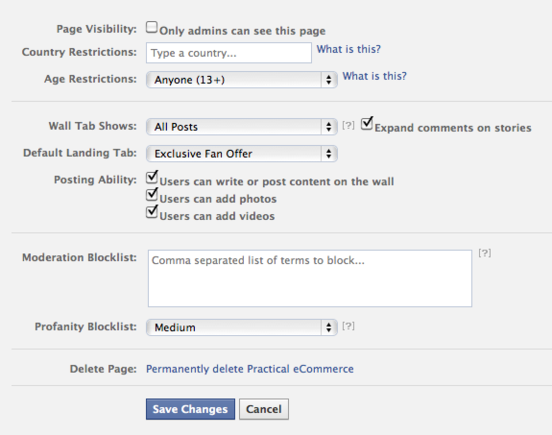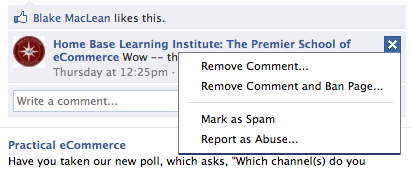A small business owner contacted me recently. She had received a comment on her Facebook page criticizing the price of her products. In her way of thinking, it would be better to have no comments at all than to give disgruntled customers the opportunity to use her Fan page as a platform to voice complaints.
I can certainly understand her issue. It is one shared by many business owners, especially those new to social media. However, I had to inform her that Facebook provides page owners with a variety of user permission and community moderation controls, but turning off comments was not one of them.
In lieu of turning off comments, then, what options do page owners and administrators have as it pertains to exerting control? This article addresses those options.
Setting Permissions
In the administrative control area of the Facebook page — which can be accessed by clicking the “Edit Page” button located on the upper right-hand corner of the Wall page when logged in as administrator — there is an option to set user permissions.
Facebook provides page owners with user permission and moderation options.
Posting Restrictions
Page owners can choose to show only Wall posts submitted by the page, not those of Fans. The option for Fans to post content to the Wall — or upload videos or photos — can also be restricted by unchecking the respective boxes located in the “Posting Ability” section, which are checked by default.
However, this does not address the issue of comments themselves. But the next sections do, to some extent.
Moderation Blocklist
Page administrators can add comma-separated keywords to the “Moderation Blocklist.” When users include blacklisted keywords in a post and or a comment on a Facebook page, the content will be automatically marked as spam. Wall posts will be moved to the page’s spam filter, which is hidden from public view. Comments will appear in gray to administrators, but will not appear to the public.
This may be the best option for preventing unwanted comments, although it is impossible to determine every word that should be included. Such actions will most likely result in good comments being flagged as spam as well.
Profanity Filter
Page owners can filter profanity at two predefined levels — “Medium” or “Strong.” Facebook will then block the most commonly reported words and phrases marked as offensive by the broader community.
Moderation on the Wall
Page owners can also exert moderation control on the Wall itself.
Page owners can moderate user comments from the Wall.
Whenever an individual user or another page posts a comment, there are four control options: (1) Remove the comment; (2) Remove the comment and ban the user; (3) Mark the comment as spam; or (4) Report it as abuse.
Page Management Requires Diligence
Facebook page management requires diligence. Each time a comment is submitted, the page administrator receives an email notice in his or her inbox. Depending on the keywords used in the moderation blacklist, there is still a chance the offending comment will appear. By the time the page administrator has an opportunity to remove the comment, the damage could already be done.
How Much Risk Are You Willing to Assume?
Another issue needs to be addressed: the rationale behind turning off comments or even removing those that are critical. From my point of view, there are two options from which business owners can choose: Either don’t have a Facebook page, or learn to adapt to the social environment.
Don’t Have a Facebook Page
In terms of marketing within social media, if preventing critical comments from appearing is a major concern, perhaps a Facebook page is not your best option. There are other forms of social media where those who wish to maintain a greater degree of control can participate.
The following graph lists a series of options based on the degree of control and risk level.
Different forms of social media offer varying degrees of risk.
What you can control:
- Website;
- Private communities;
- Blogs.
What you can influence:
- Targeted applications;
- User-generated content;
- Licensed tools.
Where you can participate:
- Social networks;
- Peer-to-peer.
The options contained in the first category bode a lesser degree of risk, while the latter offers a greater degree. If you find a Facebook Fan page too risky, my recommendation is to consider starting a blog or your own branded online community.
Adapt to the Facebook Environment
If participation in Facebook is still a consideration, then it becomes imperative that Fan page owners adapt to the conversational culture imposed by the social network. From time-to-time negative comments may appear and page owners need to be prepared to deal with those prior to their occurrence. Here are two tips for doing so:
-
Develop a Policy. Create a social media usage policy that applies to Facebook Fans and that includes guidelines on what constitutes acceptable comments and what does not. A useful resource is Social Media Governance, a website that contains 174 examples of governance policies from a variety of industries, including consumer products and services. Such policies should detail what actions will be taken for comments that do not meet the standard for acceptable criteria.
-
Adjust to Negative Comments. Learn that negative comments can hold positive value. In today’s cultural climate, people want what’s real and they tend to favor companies that share that mindset. A willingness to allow critical comments sends a positive message about a brand, that it supports the two major hallmarks of social media marketing philosophy — “authenticity” and “transparency” — ideals to which any company wishing to leave a positive lasting impression in social media should aspire.
The one thing a brand does not want to do is “whitewash” its Fan page by deleting all but positive comments. Such attempts at sanitizing are sure to be met with disdain by the community.
The Appropriate Method to Deal with Criticism
The question is not so much whether to allow the comment to remain, but how to respond to it. My recommendation is that you take it at face value. If the criticism seems serious and has merit, then thank the commenter for taking time to address the issue, and state your side of the argument. In some cases, that may involve apologizing for an error made on your part. At other times, it may mean that a clear explanation of your policies is in order. Often, a negative comment is an indicator the commenter doesn’t clearly understand the issue and an explanation is all that’s required to stem the tide of criticism.
If the comment is nothing more than “flame throwing,” feel free to delete it. Having a clear-cut commenting policy in place makes deleting the comment less problematic.
Conclusion
I understand why an ecommerce merchant or small business owner would want to prevent negative criticism. However, the harsh reality is that people are already talking to each other on Facebook and other social networks, as well as in tweets, blog posts and on forums.
The paradox is that, by bringing those conversations “in-house” onto a platform where you can address them directly through comments of your own, you actually are exerting control. Moreover, you are making a strong philosophical statement — that yours is a brand willing to embrace criticism — a stance that can lead to greater credibility and improved trust and customer loyalty.




